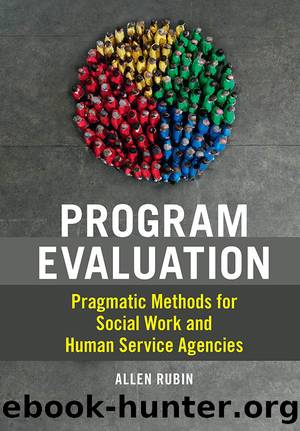Program Evaluation by Allen Rubin

Author:Allen Rubin
Language: eng
Format: mobi
Publisher: Cambridge University Press
Published: 2020-07-23T05:00:00+00:00
Program administrators are unlikely to approve of a randomized experimental evaluation design unless it is required as part of a grant to fund a new program. Proposing such a design without such a grant would not be the best way to impress an administrator. However, I do not want to understate the importance and value of randomized experimental designs, which in clinical outcome evaluations are called randomized controlled trials (RCTs). They are the best way to establish causality, and the risks associated with using less rigorous but more feasible designs are important. So, whenever it is feasible for you to conduct a randomized experiment, I encourage you to do it. This chapter has merely sought to show the rationale for using alternatives to that kind of design in light of pragmatic, feasibility obstacles. Now that you have seen the logical and practical rationale for designing and conducting outcome evaluations that lack randomized experimental designs when RCTs are not feasible – as well as the need to be careful with how you interpret and make recommendations based on the more limited evaluations – the next chapter will examine some pragmatic alternative outcome design options, their strengths and limitations, and how they can be improved.
Download
This site does not store any files on its server. We only index and link to content provided by other sites. Please contact the content providers to delete copyright contents if any and email us, we'll remove relevant links or contents immediately.
| Anthropology | Archaeology |
| Philosophy | Politics & Government |
| Social Sciences | Sociology |
| Women's Studies |
The Secret History by Donna Tartt(19027)
The Social Justice Warrior Handbook by Lisa De Pasquale(12182)
Thirteen Reasons Why by Jay Asher(8883)
This Is How You Lose Her by Junot Diaz(6872)
Weapons of Math Destruction by Cathy O'Neil(6260)
Zero to One by Peter Thiel(5782)
Beartown by Fredrik Backman(5734)
The Myth of the Strong Leader by Archie Brown(5491)
The Fire Next Time by James Baldwin(5423)
How Democracies Die by Steven Levitsky & Daniel Ziblatt(5211)
Promise Me, Dad by Joe Biden(5139)
Stone's Rules by Roger Stone(5078)
A Higher Loyalty: Truth, Lies, and Leadership by James Comey(4946)
100 Deadly Skills by Clint Emerson(4911)
Rise and Kill First by Ronen Bergman(4775)
Secrecy World by Jake Bernstein(4738)
The David Icke Guide to the Global Conspiracy (and how to end it) by David Icke(4696)
The Farm by Tom Rob Smith(4500)
The Doomsday Machine by Daniel Ellsberg(4481)
